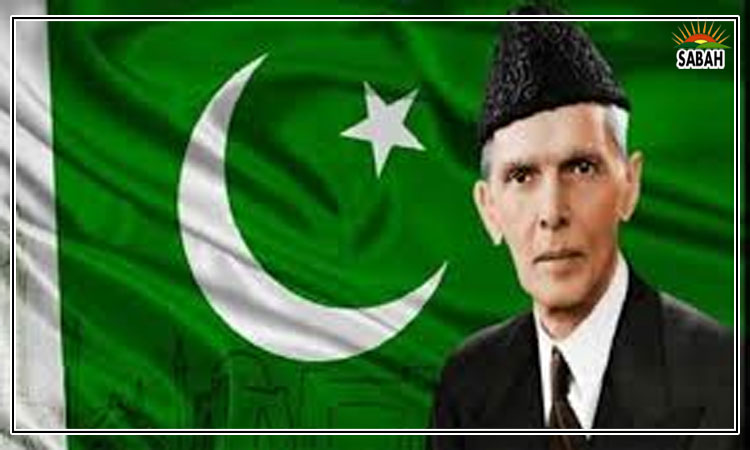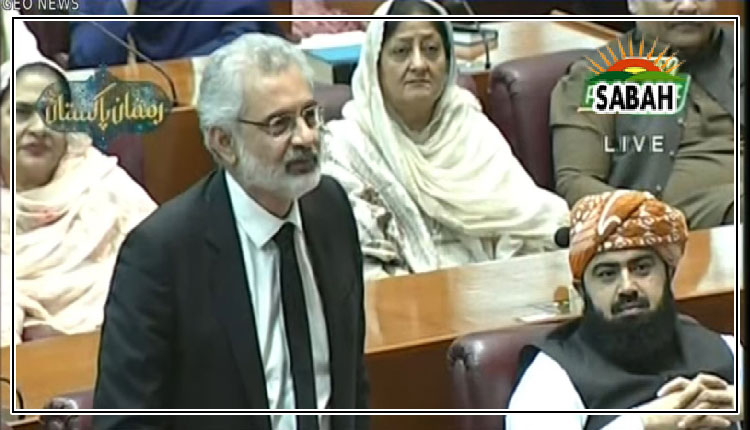Justice Qazi Faez Isa says he & the country’s top court stood with the Constitution
ISLAMABAD, April 10 (SABAH): Senior puisne judge of the Supreme Court of Pakistan, Justice Qazi Faez Isa, said on Monday that he and the country’s top court stood with the Constitution.
Justice Qazi Faez Isa made the remarks while addressing a special national constitutional convention at the National Assembly hall to mark the golden jubilee of the Constitution of Pakistan, where he was the only top court judge in attendance.
The Constitution was passed by the National Assembly on April 10, 1973, authenticated by the president on April 10, 1973, and promulgated on August 14, 1973.
At the outset of his speech, Justice Isa clarified that he was not here to make a political speech but to say “on behalf of myself and my institution that we stand with this book (the Constitution).” As he made the remarks, which were met with thumping of desks by the participants, Justice Isa also held up a copy of the Constitution.
“This book is our identity, Pakistan’s identity. The elected representatives of the time unanimously voted on it, there was no negative vote. There were four abstentions I think.”
Justice Isa called for recognising the importance of the Constitution. He said that all the participants of the convention were politicians who looked at matters through a particular lens but he was a lawyer who looked at matters through the lens of the law.
Recalling his time as chief justice of Balochistan High Court (BHC), Justice Isa said he was at first hesitant to take up the mantle but strived hard to set up the high court and appoint judges.
“Sometimes we don’t hate our enemies as much as we hate each other. Why is that? Us and you, you as in parliament, and the bureaucracy should have one focus: serving the people.
“Our job is to make decisions swiftly according to the law and the Constitution. Your job is to make laws which are beneficial for the people. And the job of the executive is to implement the laws and the policies made by the government of the time.”
Gesturing towards NA Speaker Raja Pervez Ashraf, he said that he had asked prior to attending today’s gathering if political matters would be talked about. “But you assured me that only constitutional matters would be talked about. But a lot of political things were talked about,” he said with a laugh.
“It is their freedom of right given by the Constitution. So I don’t say anything to them but that does not mean I agree with them. I want to make this clear. Perhaps, tomorrow cases of these people will [be heard] and decisions will be taken against them and maybe they will talk against me so I just want to make it clear that I came [for the] golden jubilee of the Constitution. This is a celebration.”
Justice Isa said that the movement for the formation of a separate homeland for Muslims started off with a “dream” that Quaid-i-Azam Muhammad Ali Jinnah and Allama Muhammad Iqbal had which later became a political movement.
“And in the whole world, the whole world, the biggest country for Muslims came into being. But now I am ashamed to say that Pakistan no longer has this privilege, it is now with Indonesia.”
He said that Maulvi Tamizuddin Khan, president of the first Constituent Assembly of Pakistan, was dismissed by a bureaucrat who formed a cabinet of ministers.
Justice Isa said that Maulvi Tamizuddin challenged his dismissal in the Chief Court of Sindh, following which the judges at the time, including Chief Justice Constantine, restored him and declared the step to be unlawful.
“Unfortunately, this was challenged in the Federal Court of the time and the decision was overturned. At the time, there was judge and the concerning thing is that this judge, Justice Cornelius, was also Christian and perhaps in the minority, if you read his judgment he talked about Islam and if you read the majority judgment said that it was [in line with] the Queen on England.”
He said that he did not like the use of the word “minorities” because they were equal citizens and they had played a huge role in the country.












